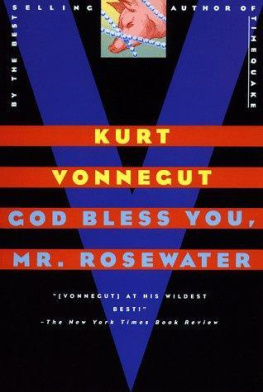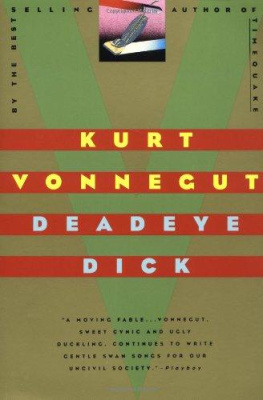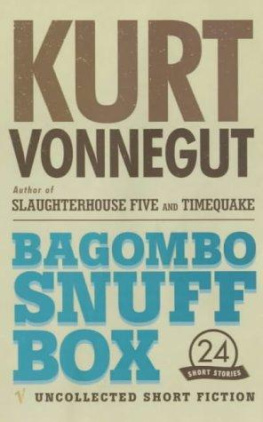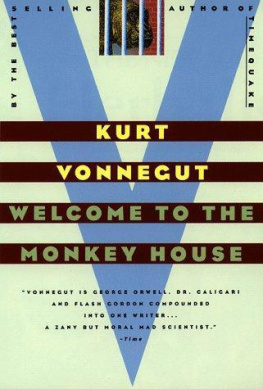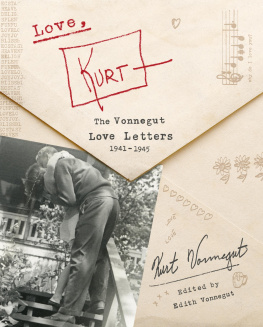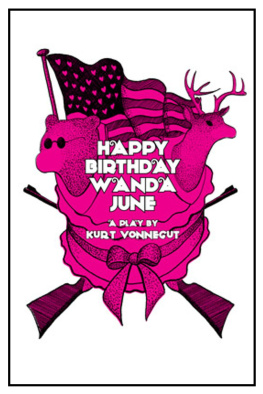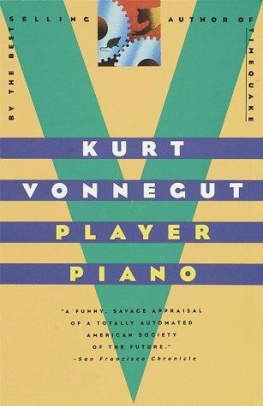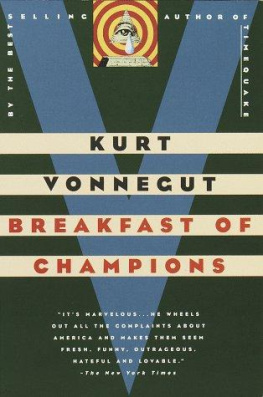GENIUS BABY!
The girl was a showgirl. Her name was Randy Herald.
"I'd be _pleased_ to help the lady with her problem," said Fred, lightly again.
"My God," said the carpenter, cocking his head and gnashing his teeth, "wouldn't anybody?"
"You think I'm _serious_?" Fred sneered at Randy Herald. "I wouldn't trade my bride for twenty thousand Randy Heralds!" He was calculatingly maudlin now. "And I don't think you guys would trade _your_ brides, either." To Fred, a bride was any woman with an insurable husband.
"I know your brides," he continued, "and any one of you would be crazy to trade." He nodded. "We are four lucky guys sitting here, and we'd better not forget it. Four wonderful brides we've got, boys, and we'd damn well better stop and thank God for 'em from time to time." Fred stirred his coffee. "I wouldn't be anything without my bride, and I know it." His bride was named Caroline. Caroline was the mother of an unattractive, fat little boy, poor little Franklin Rosewater. Caroline had taken lately to drinking lunch with a rich Lesbian named Amanita Buntline.
"I've done what I can for her," Fred declared. "God knows it isn't enough. Nothing could be enough." There was a real lump in his throat. He knew that lump had to be there and it had to be real, or he wouldn't sell any insurance. "It's something, though, something even a poor man can do for his bride."
Fred rolled his eyes mooningly. He was worth forty-two thousand dollars dead.
*
Fred was often asked, of course, whether he was related to the famous Senator Rosewater. Fred's self-effacing, ignorant reply was along the lines of, "Somewhere, somehow, I guess --way, way back." Like most Americans of modest means, Fred knew nothing about his ancestors. There was this to know:
The Rhode Island branch of the Rosewater family was descended from George Rosewater, younger brother of the infamous Noah. When the Civil War came, George raised a company of Indiana riflemen, marched off with them to join the nearly legendary _Black Hat Brigade_. Under George's command was Noah's substitute, the Rosewater village idiot, Fletcher Moon. Moon was blown to hamburger by Stonewall Jackson's artillery at Second Bull Run.
During the retreat through the mud toward Alexandria, Captain Rosewater took time out to write his brother Noah this note:
Fletcher Moon kept up his end of the deal to the utmost of his ability. If you are put out about your considerable investment in him being used up so quickly, I suggest you write General Pope for a partial refund. Wish you were here.
George
file:///G|/Program%20Files/eMule/Incoming/Ku...20-%20God%20Bless%20You%20Mr%20Rosewater.txt (40 of 79) [10/18/2004 5:20:35 PM]
file:///G|/Program%20Files/eMule/Incoming/Kurt%20Vonnegut%20-%20God%20Bless%20You%20Mr%20Rosewater.txt To which Noah replied:
I am sorry about Fletcher Moon, but, as the _Bible_ says, "A deal is a deal." Enclosed find some routine legal papers for you to sign. They empower me to run your half of the farm and the saw factory until your return, etc., etc. We are undergoing great privations here at home. Everything is going to the troops. A word of appreciation from the troops would be much appreciated.
Noah
By the time of Antietam, George Rosewater had become a Lieutenant Colonel, and had, curiously, lost the little fingers from both hands. At Antietam, he had his horse shot out from under him, advanced on foot, grabbed the regimental colors from a dying boy, found himself holding only a shattered staff when Confederate cannister carried the colors away. He pressed on, killed a man with the staff. At the moment he was doing the killing, one of his own men fired off a musket that still had its ramrod jammed down the bore. The explosion blinded Colonel Rosewater for life.
*
George returned to Rosewater County a blind brevet brigadier. People found him remarkably cheerful. And his cheerfulness did not seem to fade one iota when it was explained to him by bankers and lawyers, who kindly offered to be his eyes, that he didn't own anything any more, that he had signed everything over to Noah. Noah, unfortunately, was not in town to explain things in person to George. Business required that he spend most of his time in Washington, New York and Philadelphia.
"Well," said George, still smiling, smiling, smiling, "as the Bible tells us in no uncertain terms, 'Business is business.'"
The lawyers and bankers felt somewhat cheated, since George didn't seem to be drawing any sort of moral from what should have been an important experience in almost any man's life. One lawyer, who had been looking forward to pointing out the moral when George got mad, couldn't restrain himself from pointing it out anyway, even though George was laughing: "People should always _read_ things before they sign them."
"You can bet your boots," said George, "that from now on I _will_." George Rosewater obviously wasn't a well man when he came back from the war, for no well man, having lost his eyes and his patrimony, would have laughed so much. And a well man, particularly if he were a general and a hero, might have taken some vigorous legal steps to compel his brother to return his property. But George filed no suit. He did not wait for Noah to return to Rosewater County, and he did not go East to find him. In fact, he and Noah were never to meet or communicate again.
He paid a call, wearing the full regalia of a brigadier, to each Rosewater County household that had given him a boy or boys to command, praising them all, mourning with all his heart for the boys who were wounded or dead. Noah Rosewater's brick mansion was being built at that time. One morning the workmen found the brigadier's uniform nailed to the front door as though it were an animal skin nailed to a barn door to dry.
As far as Rosewater County was concerned, George Rosewater had disappeared forever.
*
George went East like a vagabond, not to find and kill his brother, but to seek work in Providence, Rhode Island. He had heard that a broom factory was being opened there. It was to be staffed by Union veterans who were blind.
What he had heard was true. There was such a factory, founded by Castor Buntline, who was neither a veteran nor blind. Buntline perceived correctly that blind veterans would make very agreeable employees, that Buntline himself would gain a place in history as a humanitarian, and file:///G|/Program%20Files/eMule/Incoming/Ku...20-%20God%20Bless%20You%20Mr%20Rosewater.txt (41 of 79) [10/18/2004 5:20:35 PM]
file:///G|/Program%20Files/eMule/Incoming/Kurt%20Vonnegut%20-%20God%20Bless%20You%20Mr%20Rosewater.txt that no Northern patriot, for several years after the war, anyway, would use anything but a _Buntline Union Beacon Broom_. Thus was the great Buntline fortune begun. And, with broom profits, Castor Buntline and his spastic son Elihu went carpetbagging, became tobacco kings.
*
When the footsore, amiable General George Rosewater arrived at the broom factory, Castor Buntline wrote to Washington, confirmed that George was a general, hired George at a very good salary, made him foreman, and named the whiskbrooms the factory was making after him. The brand name entered ordinary speech for a little while. A "General Rosewater" was a _whiskbroom_. And blind George was given a fourteen-year-old girl, an orphan named Faith Merrihue, who was to be his eyes and his messenger. When she was sixteen, George married her. And George begat Abraham, who became a Congregationalist minister. Abraham went as a missionary to the Congo, where he met and married Lavinia Waters, the daughter of another missionary, an Illinois Baptist.
In the jungle, Abraham begat Merrihue. Lavinia died at Merrihue's birth. Little Merrihue was nursed on the milk of a Bantu.

